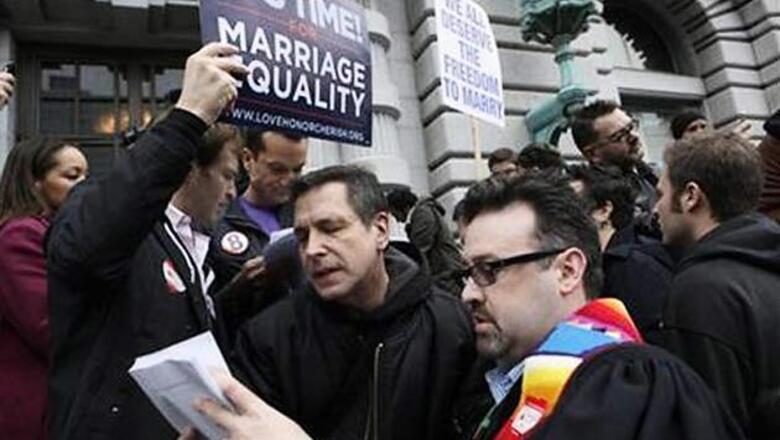
views
San Francisc: A US appeals court on Tuesday found California's gay marriage ban unconstitutional in a case that is likely to lead to a showdown on the issue in the US Supreme Court.
The 2-1 decision from the 9th US Circuit Court of Appeals featured two judges appointed by Democrats ruling against the ban, while a Republican-appointed judge dissented.
California joined the vast majority of US states in outlawing same-sex marriage in 2008, when voters passed the ban known as Proposition 8.
That socially conservative vote by a state more known for hippies and Hollywood was seen as a watershed by both sides of the so-called culture wars, and two gay couples responded by filing the legal challenge currently making its way through the federal courts.
The 9th Circuit's rules allow at least two weeks before a ruling takes effect, so same sex marriages cannot immediately resume in California, court spokesman Dave Madden said. Prop 8 proponents previously made clear that they will appeal, which would almost certainly keep gay marriage on hold pending future proceedings.
A federal judge in San Francisco struck down Proposition 8 in 2010, and gay marriage opponents appealed that ruling to the 9th US Circuit Court of Appeals.
Opponents and supporters of same-sex marriage both have said they are ready to appeal the decision all the way to the US Supreme Court.
Opponents of gay marriage could ask a larger 9th Circuit panel to hear the matter, or decide to appeal directly to the Supreme Court.
In the 9th Circuit ruling on Tuesday, Judge Stephen Reinhardt emphasized that the court was not deciding the broader question of whether marriage was a fundamental right for same sex couples as well as heterosexuals. Rather, the judges focused on the unique circumstances of Prop 8 in California.
"Although the Constitution permits communities to enact most laws they believe to be desirable," Reinhardt wrote, "it requires that there be at least a legitimate reason for the passage of a law that treats different classes of people differently."
"There was no such reason that Proposition 8 could have been enacted," Reinhardt wrote.
Judge Michael Daly Hawkins joined Reinhardt's opinion, while Judge N. Randy Smith dissented from the main constitutional findings.
About 40 of the 50 US states had outlawed gay marriage before a California state court ruled in 2008 that a ban was unconstitutional, leading to a summer of gay marriages. But California voters that November decided to change the state constitution to limit marriage to a man and woman.
It provoked some gay rights activists to take a matter that had been waged on a state-by-state basis to federal court, essentially staking the entire agenda on one case. Republican Ted Olson and Democrat David Boies - attorneys who represented George W. Bush and Al Gore, respectively, in the legal case that decided the 2000 presidential election - joined forces to take on Proposition 8 in court.
The US Supreme Court is seen as a more conservative body than the lower courts that have been considering the case. Should the high court eventually decide to hear the case, much may depend on Anthony Kennedy, a Republican-appointed justice who has written important pro-gay rights decisions but has not explicitly endorsed gay marriage.
Six states - New York, Massachusetts, Connecticut, Vermont, New Hampshire and Iowa - allow gay marriage, as does Washington, DC.
In addition, New Jersey and Washington state are considering legislation to legalize same-sex marriage, and gay rights activists in Maine say they plan to bring the issue to voters in a referendum in that state.




















Comments
0 comment